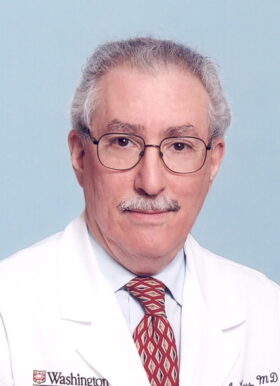
Michael Kass, MD
Bernard Becker Professor, Ophthalmology and Visual Sciences
- Email: kass@nospam.wustl.edu
Education:
- Undergraduate: University of Michigan
- Medical Degree: Northwestern University School of Medicine
- Master’s in Neurophysiology: Northwestern University School of Medicine
Academic Positions:
- Assistant Professor: Yale University School of Medicine
- Professor: WashU Medicine in St. Louis
- Chairman: Department of Ophthalmology and Visual Sciences, Washington University School of Medicine (1998-2014)
Research and Contributions:
Dr. Michael Kass is renowned for his pioneering research in the field of ophthalmology, particularly in the study of glaucoma. His early work on the effects of prostaglandins on the eye contributed to the development of effective pharmacologic treatments for glaucoma. Dr. Kass has demonstrated that adherence to prescribed medical treatment is often suboptimal, providing insight into why some glaucoma patients progress despite maintaining good intraocular pressure measurements in clinical settings.
He participated in the pivotal 5FU and Glaucoma Filtering Surgery Trial, which confirmed that antimetabolite agents improve trabeculectomy outcomes. As the principal investigator of the Ocular Hypertension Treatment Study (OHTS), Dr. Kass’s research has significantly impacted the understanding and management of ocular hypertension—a major risk factor for open-angle glaucoma. OHTS established that early treatment reduces the incidence of open-angle glaucoma and developed a predictive model for estimating the risk of this condition. The study also provided 20-year estimates of visual field loss incidence, helping clinicians and patients make informed decisions about treatment and monitoring.
Awards and Honors:
- Life Achievement Award: American Academy of Ophthalmology
- International Glaucoma Societies Award
- Leslie Dana Medal: St. Louis Society for the Blind and Visually Impaired
- President’s Award: American Glaucoma Society
Dr. Michael Kass’s contributions to ophthalmology have had a lasting impact on the field, particularly in the understanding and treatment of glaucoma. His dedication to research and patient care continues to influence clinical practices and improve outcomes for patients worldwide.